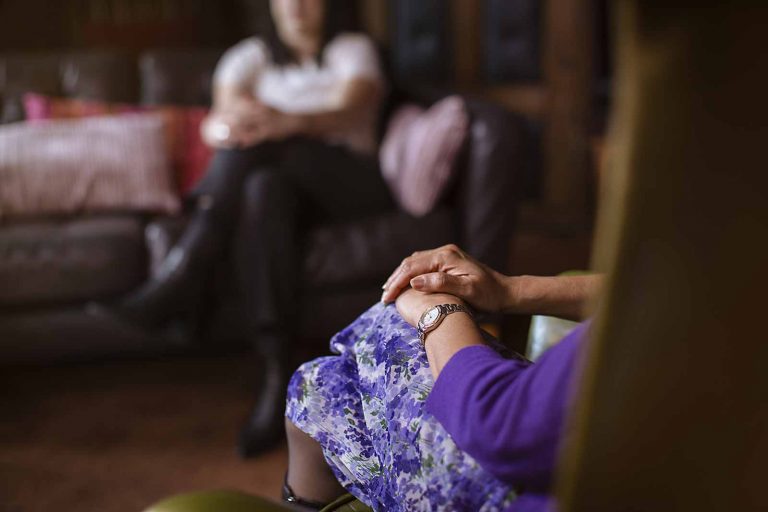Self-harm
What is self-harm?
Self-harm is the deliberate damage of your body and more often than not with no conscious intent to commit suicide. It can take many forms and may include:
- Taking too many tablets – taking an overdose
- Cutting
- Burning
- Banging your head or throwing yourself against a hard surface
- Punching yourself
- Sticking things in your body
- Swallowing things
Someone who self-harms is usually dealing with very difficult emotions, painful memories or is overwhelmed by their situation or experiences.
Young people have the highest rate of self-harm. Approximately three teenagers harm themselves every hour in the UK and one in ten have harmed by the age of 16. Figures suggest that four times more girls harm themselves than boys. Self-harm is often done secretively and someone can suffer for many years before seeking help or before anyone else finds out.
A person will often struggle with difficulties for some time before they begin to self-harm and is more likely to happen if drugs and alcohol are involved.
Self-harm usually occurs in private. The arms, legs and front of the body are usually the target areas for self-harm. People who self-harm tend to use more than one method to harm themselves. The signs and symptoms may include:
Symptoms of self-harm
- Scars, often in patterns
- Fresh scratches, cuts, bruises or bite marks
- Excessive rubbing of an area to create a burn
- Wearing long sleeves and long trousers even in hot weather
- Frequent reports of accidental injury
- Difficulties with personal relationships
- Behavioural and emotional instability, impulsivity and unpredictability
- Statements of helplessness, hopelessness and worthlessness
Causes of self-harm
There are a number of reasons why people self-harm and everyone will have their own reason for doing it. However, there are some reasons that are common and include to:
- Release or express anger
- Turn emotional pain into physical pain – as some people feel they can cope with that pain more easily
- Communicate distress
- Punish themselves
It can be very distressing if you know someone who is self-harming. The most important thing you can do is listen and try and understand their feelings and not be judgmental or critical. This can be very difficult if you are feeling upset or angry.
You could try:
- Talk to them when they feel like self-harming and try and move the conversation onto other things
- Help them find out more about self-harming. This can be showing them a leaflet or information from a credible source on the internet
- Find out about getting help. The GP is a good staring point
- Encourage them to see their self-harm as a problem that needs addressing rather than a shameful secret
You shouldn’t try:
- Don’t try to be their therapist, it unlikely you are equipped to do this and you will have enough to do being their friend and offering support
- Expect this to stop overnight
- React strongly as this will most likely make them feel worse
- Make them promise not to do it again
- Suggest you won’t see them until they stop self-harming
- Feel responsible for them. You may need to talk to someone close to you to offer support
Treatments for self-harm
It is important to receive treatment for self-harm as over time, the risk of seriously hurting yourself can increase. Patients who are self-harming will be seen by a psychiatrist to identify the reasons for the self-harm and to discuss and agree a treatment plan. Some patients will be admitted to the Clinic as an in-patient and take part in the therapeutic programme that runs throughout the day. Others will benefit from attending our day patient programme. You can attend from one day per week up to three full days per week this will depend on need and availability. You will participate in the therapeutic programme that runs throughout the day. Many patients attend the Clinic on an out-patient basis where you will have 1:1 sessions with your psychiatrist and/or therapist. Your psychiatrist will advise the best option for you based on the severity of your illness and your individual circumstances.




Medication for self-harm
If you have other mental health problems such as depression, your consultant may prescribe medication to treat the symptoms. Medication for underlying conditions may include anti-depressants, which will address the low mood. These may need to be taken for a while before you notice a benefit. You should not stop taking any medications without first checking with your consultant as you may experience side effects.
Therapy approach for self-harm
In most cases the treatment approach will be psychological therapies and is likely to include Cognitive Behavioural Therapy (CBT). Your therapist will ask about your thoughts and feelings and how they affect your behaviour. They will work with you to set goals to manage and treat the reasons for the self-harm. You will learn to recognise and the triggers that cause you to self-harm and learn some coping strategies to help you manage your stress in healthier ways.
Outcomes
As with all mental health conditions, early diagnosis is recommended so treatment can begin and help you learn coping mechanisms so you no longer have the urge to self-harm. You won’t always feel the way you do now about lost of things so with help and support things can become more manageable or even go away.
We're here to help you
Call Cardinal Clinic on 01753 910729
Or refer yourself for care, make an enquiry
or arrange a free nurse consultation via our
help hub.
A calm environment dedicated to your care
Rated ‘Outstanding’ for care and overall ‘Good’ by the Care Quality Commission, Cardinal Clinic works tirelessly to offer an elevated patient experience from exquisite and fresh chef-prepared meals, to comfortable and relaxing accommodations. Situated in a private estate in the heart of Windsor’s green belt, residential in-patient care, day care and out-patient services are offered.


